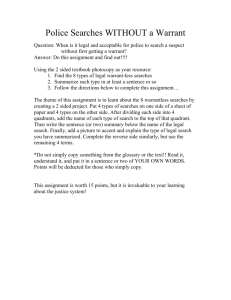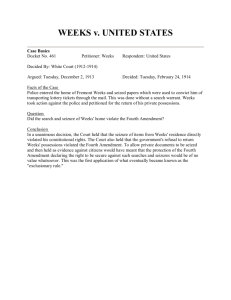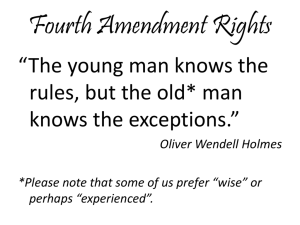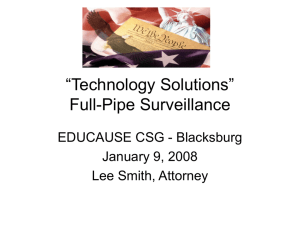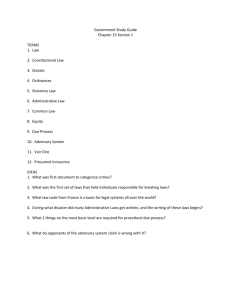State of Florida v. Williams Motion To Dismiss
advertisement
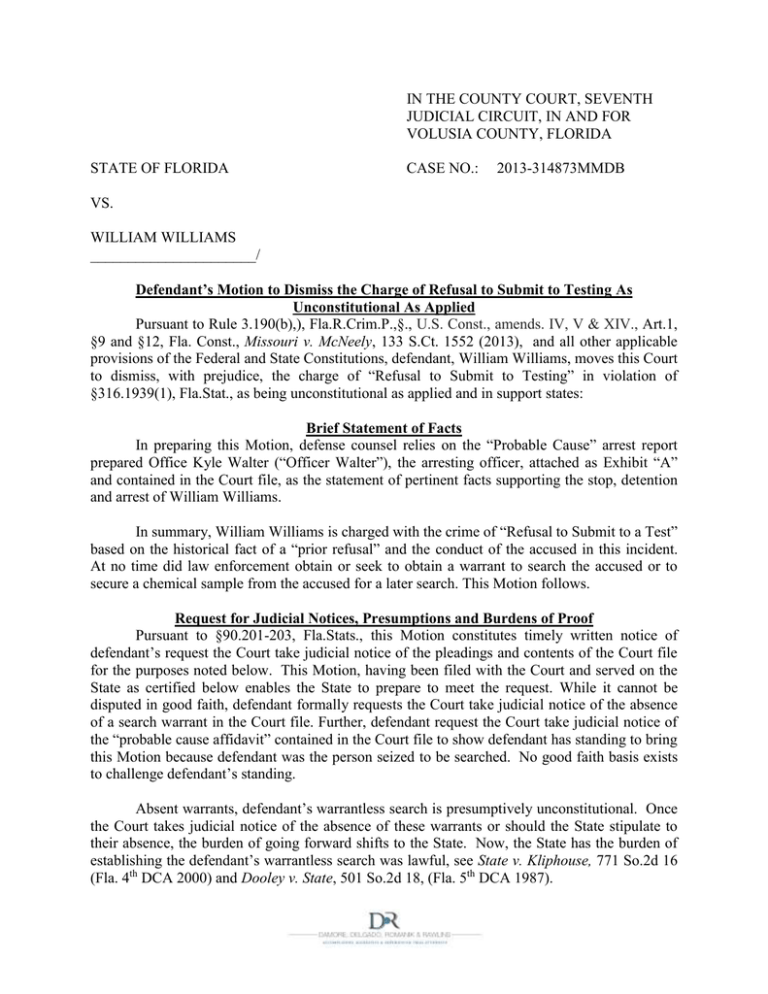
IN THE COUNTY COURT, SEVENTH JUDICIAL CIRCUIT, IN AND FOR VOLUSIA COUNTY, FLORIDA STATE OF FLORIDA CASE NO.: 2013-314873MMDB VS. WILLIAM WILLIAMS ______________________/ Defendant’s Motion to Dismiss the Charge of Refusal to Submit to Testing As Unconstitutional As Applied Pursuant to Rule 3.190(b),), Fla.R.Crim.P.,§., U.S. Const., amends. IV, V & XIV., Art.1, §9 and §12, Fla. Const., Missouri v. McNeely, 133 S.Ct. 1552 (2013), and all other applicable provisions of the Federal and State Constitutions, defendant, William Williams, moves this Court to dismiss, with prejudice, the charge of “Refusal to Submit to Testing” in violation of §316.1939(1), Fla.Stat., as being unconstitutional as applied and in support states: Brief Statement of Facts In preparing this Motion, defense counsel relies on the “Probable Cause” arrest report prepared Office Kyle Walter (“Officer Walter”), the arresting officer, attached as Exhibit “A” and contained in the Court file, as the statement of pertinent facts supporting the stop, detention and arrest of William Williams. In summary, William Williams is charged with the crime of “Refusal to Submit to a Test” based on the historical fact of a “prior refusal” and the conduct of the accused in this incident. At no time did law enforcement obtain or seek to obtain a warrant to search the accused or to secure a chemical sample from the accused for a later search. This Motion follows. Request for Judicial Notices, Presumptions and Burdens of Proof Pursuant to §90.201-203, Fla.Stats., this Motion constitutes timely written notice of defendant’s request the Court take judicial notice of the pleadings and contents of the Court file for the purposes noted below. This Motion, having been filed with the Court and served on the State as certified below enables the State to prepare to meet the request. While it cannot be disputed in good faith, defendant formally requests the Court take judicial notice of the absence of a search warrant in the Court file. Further, defendant request the Court take judicial notice of the “probable cause affidavit” contained in the Court file to show defendant has standing to bring this Motion because defendant was the person seized to be searched. No good faith basis exists to challenge defendant’s standing. Absent warrants, defendant’s warrantless search is presumptively unconstitutional. Once the Court takes judicial notice of the absence of these warrants or should the State stipulate to their absence, the burden of going forward shifts to the State. Now, the State has the burden of establishing the defendant’s warrantless search was lawful, see State v. Kliphouse, 771 So.2d 16 (Fla. 4th DCA 2000) and Dooley v. State, 501 So.2d 18, (Fla. 5th DCA 1987). The McNeely Decision Has Changed the Legal Landscape for Chemical Tests in All Driving Under the Influence Prosecutions In Missouri v. McNeely, 133 S. Ct. 1552, 1568 (2013), the United States Supreme Court clarified how the Fourth Amendment is applied to warrantless searches in a routine DUI case: “We first considered the Fourth Amendment restrictions on such searches in Schmerber, where, as in this case, a blood sample was drawn from a defendant suspected of driving while under the influence of alcohol. 384 U.S., at 758, 86 S.Ct. 1826. Noting that “[s]earch warrants are ordinarily required for searches of dwellings,” we reasoned that “absent an emergency, no less could be required where intrusions into the human body are concerned,” even when the search was conducted following a lawful arrest. Id., at 770, 86 S.Ct. 1826. We explained that the importance of requiring authorization by a “‘neutral and detached magistrate’ ” before allowing a law enforcement officer to “invade another's body in search of evidence of guilt is indisputable and great.” Ibid. (quoting Johnson v. United States, 333 U.S. 10, 13–14, 68 S.Ct. 367, 92 L.Ed. 436 (1948)).As noted, the warrant requirement is subject to exceptions. “One well-recognized exception,” and the one at issue in this case, “applies when the exigencies of the situation make the needs of law enforcement so compelling that a warrantless search is objectively reasonable under the Fourth Amendment.” Kentucky v. King, 563 U.S. ––––, ––––, 131 S.Ct. 1849, 1856, 179 L.Ed.2d 865 (2011) (internal quotation marks and brackets omitted). “ The Court affirmed the suppression of evidence in McNeely concluding: We hold that in drunk-driving investigations, the natural dissipation of alcohol in the bloodstream does not constitute an exigency in every case sufficient to justify conducting a blood test without a warrant. Post McNeely, in State v. Butler, 232 Ariz. 84, 302 P.3d 609, 612 (2013), the Arizona Court suppressed a blood test, finding consent was involuntary, and stated: “McNeely also forecloses the State's arguments that requiring warrants for blood draws will unduly burden law enforcement officials or render Arizona's implied consent law meaningless. “In those drunk-driving investigations where police officers can reasonably obtain a warrant before a blood sample can be drawn without significantly undermining the efficacy of the search, the Fourth Amendment mandates that they do so.” Id. at 1561.In general, under the Fourth Amendment, warrantless searches “are per se unreasonable ... subject only to a few specifically established and well-delineated exceptions.” Arizona v. Gant, 556 U.S. 332, 338, 129 S.Ct. 1710, 173 L.Ed.2d 485 (2009). One such exception is exigent circumstances, but the State has not argued that this exception authorized the blood draw here.” Breath Test and Urine Tests are Searches Under the Fourth Amendment While McNeely specifically addressed a situation in which law enforcement tried to take a blood sample, the warrantless search issue is equally applicable to a chemical test of a suspect’s breath or urine. It is well established the taking of a breath or urine sample to test for the presence of alcohol constitutes a search under the Fourth Amendment. Skinner v. Railway Labor Executives' Ass'n, 489 U.S. 602, 616-617, 109 S.Ct. 1402, 103 L.Ed.2d 639 (1989) (holding that “[s]ubjecting a person to a breathalyzer test, which generally requires the production of alveolar or ‘deep lung’ breath for chemical analysis, implicates similar concerns about bodily integrity and ... should ... be deemed a search”) cited in Spencer v. City of Bay City, 292 F. Supp. 2d 932, 939 (E.D. Mich. 2003). Obtaining a urine sample is also an intrusive search: “Compelling a person to produce a urine sample on demand also intrudes deeply on privacy and bodily integrity. Urination is among the most private of activities. It is generally forbidden in public, eschewed as a matter of conversation, and performed in places designed to preserve this tradition of personal seclusion. Cf. Martinez–Fuerte, 428 U.S., at 560, 96 S.Ct., at 3084 (border-stop questioning involves no more than “some annoyance” and is neither “frightening” nor “offensive”). … That the privacy interests offended by compulsory and supervised urine collection are profound is the overwhelming judgment of the lower courts and commentators. As Professor—later Solicitor General—Charles Fried has written: “[I]n our culture the excretory functions are shielded by more or less absolute privacy, so much so that situations in which this privacy is violated are experienced as extremely distressing, as detracting from one's dignity and self esteem.” Privacy, 77 Yale L.J. 475, 487 (1968).9 … compulsory urination constitutes a search for the purposes of the Fourth Amendment: “ ‘There are few activities in our society more personal or private than the passing of urine. Most people describe it by euphemisms if they talk about it at all. It is a function traditionally performed without public observation; indeed, its performance in public is generally prohibited by law as well as social custom.’ ” Ante, at 1413, quoting National Treasury Employees Union v. Von Raab, 816 F.2d 170, 175 (CA5 1987).” Skinner v. Ry. Labor Executives' Ass'n, 489 U.S. 602, 645-47 (1989) It is a cornerstone of American jurisprudence that warrantless searches are per se illegal. Camara v. Mun. Court of City & Cnty. of S. F., 387 U.S. 523, 528, 87 S.Ct. 1727, 18 L.Ed.2d 930 (1967) (“The basic purpose of [the Fourth] Amendment, as recognized in countless decisions of this Court, is to safeguard the privacy and security of individuals against arbitrary invasions by governmental officials.”). Jardines v. State, 73 So. 3d 34, 49 (Fla. 2011) aff'd, 133 S. Ct. 1409 (U.S. 2013) Given that a breath test, urine or blood test is a search, law enforcement requires a warrant absent exceptional circumstances. McNeely instructs Courts the natural elimination of alcohol or other intoxicants is a not a per se exigent circumstance to create an exception to the warrant requirement for a search. The rulings of the United States Supreme Court are binding on the Florida courts stated: “Article I, section 12 of the Florida Constitution provides that the right to be free from unreasonable searches and seizures “shall be construed” as the Fourth Amendment is interpreted by the United States Supreme Court. As between courts and legislatures, only courts construe constitutions. Accordingly, the limiting language in article I, section 12 does not prohibit the legislature from passing statutes which give Florida citizens greater protections than the Fourth Amendment.” (emphasis added) State v. Langsford, 816 So. 2d 136, 139 (Fla. 4th DCA 2002) As the many cases cited in this Motion make clear, there is nothing about a DUI investigation that overrides the clear protections the Framers’ left us; the Fourth Amendment provides that “[t]he right of the people to be secure in their persons, houses, papers, and effects, against unreasonable searches and seizures, shall not be violated; and no Warrants shall issue, but upon probable cause, supported by Oath or affirmation, and particularly describing the place to be searched, and the persons or things to be seized.” Constitutional requirements like probable cause are not fair-weather friends, present when advantageous, conveniently absent when “special needs” make them seem not. Skinner v. Ry. Labor Executives' Ass'n, 489 U.S. 602, 637 (1989). The Crime of “Refusal to Submit to Testing” The purpose of the “Refusal” statute is two-fold. First, it creates an administrative penalty for refusing to submit to a chemical test, enforced by the Department of Highway Safety & Motor vehicles (“DHSMV”), and resulting in a suspension of driving privileges. Second, the Statute creates the crime of “Refusal to Submit to Testing” (“Refusal”) in violation of §316.1939(1), Fla.Stat., which a first degree misdemeanor punishable as provided for in §775.082 and §775.083, Fla.Stats. To prove the crime of “Refusal”, the State must establish the six (6) elements set forth in Jury Instruction 28.13 (attached) including the existence of probable cause to believe the accused was driving under the influence and the historical “fact” of a prior refusal to submit to testing. As with all criminal offenses, the charge of “Refusal” must be strictly construed in favor of the accused §775.021, Fla.Stat. It is the role of a “neutral magistrate” is to determine whether probable cause exists to support a search and issue a warrant if there is probable cause. In this case, there was no search warrant. Therefore, as applied to these facts, the crime of “Refusal” would create penal sanctions for a citizen exercising a fundamental right to be free from warrantless searches. Because of the potential criminal consequences, an accused has a constitutional right to insist the police obtain a warrant; “we therefore conclude that appellant had a constitutional right to insist that the inspectors obtain a warrant to search and that appellant may not constitutionally be convicted for refusing to consent to the inspection.” Camara v. Mun. Court of City & County of San Francisco, 387 U.S. 523, 540 (1967) On these facts, to create criminal penalties for conduct which is clearly constitutionally protected and preclude a citizen from insisting on due process and a search warrant, results in the “Refusal” statute being unconstitutional as applied. Relief Requested WHEREFORE, on these grounds and others which may be argued ore tenus, defendant requests this Court enter an Order dismissing the pending “Refusal” charge, with prejudice, as unconstitutional as applied to defendant or grant any other relief this Court deems necessary. Certificate of Service (E-Service) I HEREBY CERTIFY that a true and correct copy of the foregoing has been furnished by hand delivery to ASA Shey McCurdy, Office of the State Attorney this 26th day of August, 2014. DAMORE, DELGADO, ROMANIK & RAWLINS /s/ Aaron D. Delgado _________________________ AARON D. DELGADO, ESQUIRE Florida Bar No. 0796271 227 Seabreeze Boulevard Daytona Beach, Florida 32118 Telephone: (386) 255-1400 Facsimile: (386) 255-8100 Attorney for Defendant adelgado@communitylawfirm.com
